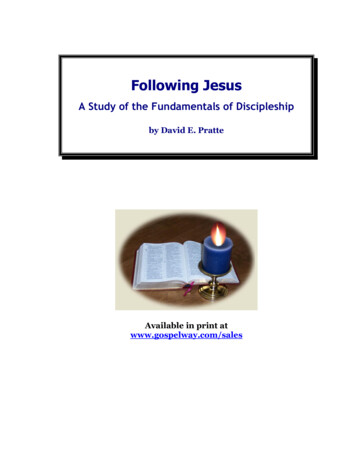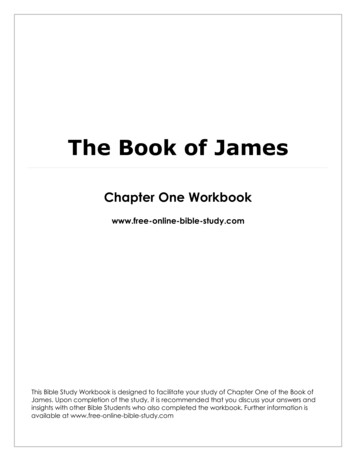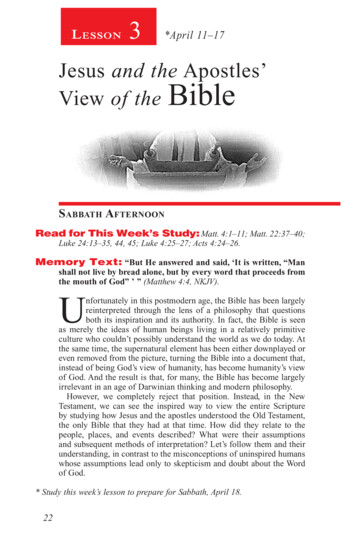
Transcription
Following JesusA Study of the Fundamentals of Discipleshipby David E. PratteAvailable in print atwww.gospelway.com/sales
Following Jesus: A Study of the Fundamentals of Discipleship Copyright David E. Pratte, 1998, 2013All rights reservedISBN-13: 978-1492232773ISBN-10: 1492232777Printed books, booklets, and tracts available atwww.gospelway.com/salesFree Bible study articles online atwww.gospelway.comFree Bible courses online atwww.biblestudylessons.comFree class books atwww.biblestudylessons.com/classbooksFree commentaries on Bible books atwww.gospelway.com/commentaryContact the author atwww.gospelway.com/commentsNote carefully: No teaching in any of our materials is intended or should ever beconstrued to justify or to in any way incite or encourage personal vengeance orphysical violence against any person.“He who glories, let him glory in the Lord”– 1 Corinthians 1:31Cover image by Mihael Simonic, distributed under GNU Free Documentation LicenseScripture quotations are generally from the New King James Version (NKJV), copyright 1982,1988 by Thomas Nelson, Inc. used by permission. All rights reserved.Following JesusPage 2
Other Books by the AuthorTopical Bible StudiesGrowing a Godly Marriage & Raising Godly ChildrenWhy Believe in God, Jesus, and the Bible? (evidences)The God of the Bible (study of the Father, Son, and Holy Spirit)Grace, Faith, and Obedience: The Gospel or Calvinism?Kingdom of Christ: Future Millennium or Present Spiritual Reign?Do Not Sin Against the Child: Abortion, Unborn Life, & the BibleTrue Words of God: Bible Inspiration and PreservationCommentaries on Bible BooksGenesisJoshua and RuthJudges1 SamuelEzra, Nehemiah, and EstherJobProverbsGospel of MarkGospel of JohnActsRomansEphesiansPhilippians and ColossiansHebrews1 & 2 PeterBible Question Class BooksGenesisJoshua and RuthJudges1 SamuelEzra, Nehemiah, and EstherJobProverbsEcclesiastesIsaiahGospel of MatthewGospel of MarkGospel of LukeGospel of JohnActsRomans1 Corinthians2 Corinthians and GalatiansEphesians and PhilippiansColossians, 1&2 Thessalonians1 & 2 Timothy, Titus, PhilemonHebrewsGeneral Epistles (James - Jude)RevelationWorkbooks with Study NotesJesus Is Lord: Workbook on the Fundamentals of the Gospel of ChristFollowing Jesus: Workbook on DiscipleshipGod’s Eternal Purpose in Christ: Workbook on the Theme of the BibleVisit our website at www.gospelway.com/sales to see a current listof books in print.
IntroductionThis booklet is designed to be used for any of the following purposes:* Bible classes for teen or adult students* New member studies* Family Bible studies* Personal studyThe material is divided into ten lessons, however each lesson will take several study sessions to complete, depending on the background and experience of the students. Furthermore, each lesson is intendedto contain an abundance of material, especially Scripture references, on each point. Some study groupsmay decide to omit even some of the main study Scriptures. Additional Scriptures are also given on manypoints so that the students can do supplementary study where needed.We urge all classes and students to emphasize the Scriptures in these studies. Teachers are encouraged to have students read the Scriptures and answer the questions as “homework” assignments. Thenthe Scriptures should be read again and discussed in the class or recitation period. The emphasisthroughout should be on God’s word, not on the author’s comments.One helpful use for this material is to study it with all new members in the congregation. The material may be taught by different families who are already members of the congregation. The first lesson maybe taught by one family in their home, the second by a different family, etc., so that by the time newmembers finish the material they also have gotten to know several members of the congregation.Note: When I quote a Scripture, I generally quote the New King James Version, unless otherwise indicated. Often – especially when I do not use quotations marks – I am not quoting any translation butsimply paraphrasing the passage in my own words.Table of ContentsHow to Change Yourself . 5How to Study the Bible . 9“Teach Us to Pray” . 16Attending Church Meetings . 23Giving to Finance Church Work . 33Human Relationships . 38Responsibilities in the Local Church . 45Purity in Everyday Life . 55Church Organization & Work . 63Church Discipline . 72To join our mailing list to be informed of new books or special sales, contact the author atwww.gospelway.com/commentsFollowing JesusPage 4
How to Change YourselfHave you ever had difficulty trying to changea habit? Humans are creatures of habit. We tendto continue acting as we have in the past. Like ariver flowing through a canyon, the longer a habitcontinues, the more deeply it becomes ingrained,and the harder it is to change. This is true of allhabits, good or bad.The importance of a habit depends on its consequences. Heroin use, for example, has far moreserious consequences than biting fingernails. Themost significant habits are those that have eternalconsequences.Ephesians 4:22-24 shows that major changesmust occur when we are converted. Old practicesand attitudes must be replaced by new ones. Wemust learn good habits like Bible study, prayer, attending church meetings, giving, teaching others,etc. We must also eliminate bad habits like foullanguage, uncontrolled temper, gambling, drugs,drinking, gossip, lying, pornography, sexualpromiscuity, etc.We need to know, not just what changes tomake, but how to make them. Change does notcome easily. Since the Scriptures provide us to allgood works (2 Timothy 3:16,17), they give all theguidance we need. Let us study 12 specific, practical steps the Bible gives to show us how to changeto become what God wants.Please look up each Scripture in bold underline below and answer the questions that follow.Step 1: Change Your Purpose in Life.Why is motivation important? Is a soundsleeper more likely to get up in the middle of thenight if the house is on fire or if he remembers hedid not brush his teeth? Christians have some ofthe strongest possible motives for changing. Consider some:Love and dedication to God1 John 5:3; 4:19,9 — Why should we obeyGod? Why should we love Him? How did He showHis love?2 Corinthians 8:5 — Describe how theMacedonians gave. Why were they so generous?Think: Why is it hard to change a specific action if we are not totally dedicated to God’s service?Page 5If you are having difficulty changing yourself,learn to appreciate God’s blessings and mercy.(See also Rom. 12:1,2; Ecc. 12:13; Matt. 6:33;16:24; 1 John 2:15-17; Matt. 10:34-37; 22:37-40;John 14:15.)Imitation of ChristName some examples from life in which people are motivated by the desire to be like someoneelse.Luke 6:40 — What is the goal of a disciple?The life most worth imitating is that of Jesus(1 Peter 2:21,22). As we face each decision in life,we should ask, "What would Jesus do?" (See alsoGal. 2:20; Matt. 16:24; Col. 3:10.)Desire for eternal life, not eternal punishment1 Corinthians 9:25 — What sacrifices doathletes make, and what motivates them? Whatgoal does a Christian seek? (See also James 1:12;Rev. 2:10; Col. 3:1-10; 2 Peter 1:10,11; 2 Thess.1:8-10.)Think: Why would a lack of motivation keeppeople from changing to please God? What aresome mistaken motives that sometimes keep people from serving God as they should?When we lack motivation to change, let usthink about God’s love for us, think about the importance of being like Christ, and think about oureternal destiny.Step 2: Believe You Can Changewith God’s Help.Proverbs 4:23 — Why is the condition ofyour heart important? What should you do aboutit?Think: What ultimately determines the wayyou act? (Cf. Matt. 15:18,19; 12:34-37.)1 Corinthians 10:13 — Describe the promise in this verse. Will you ever face a temptation sogreat you have no choice but to sin? How can youavoid sinning?How to Change
Think: Explain the phrase “God is faithful.”Can people and circumstances force you to doevil? Is there ever a valid excuse for sin?Philippians 4:13 — What does this versepromise? Whose strength must we rely on?Think: What is repentance? (See Matt.21:28,29; Acts 17:30; 11:23.)Proverbs 28:13 — Should we cover up sin,excuse it, blame someone else? What should wedo?Think: Does God promise that our ownstrength alone can keep us faithful? What mayhappen if we trust our own power instead ofChrist’s?Psalm 37:5 — What will God accomplish foryou? What must you do first?Think: Is it enough just to be sorry for oursins? What else is needed? (See 2 Cor. 7:10.)Most achievements in life require about 10%ability and 90% just plain determination and hardwork. In spiritual matters, God has granted everyaccountable person the ability to please Him; sowe are completely able to change. God has provided everything we need. The decision is ours.We will never change until we make up ourminds to pursue the means God provides until wesucceed. The decision to do this is repentance, andno one will change to please God without it.Think: How should we respond to people whosay, “I just can’t change. It’s too late. Besides, I’monly human.” If a person thinks this way, will theybe likely to succeed in serving God? Explain youranswer.No matter how strong a temptation you face,no matter how long you have practiced a sin, ifGod says to change, you can change. (See alsoEph. 6:10-18; 3:20,21; 2 Cor. 9:8; Josh. 1:5-9.)Step 3: Study the Bible About Your Habit.Joshua 1:8 — To succeed in God’s work,what did Joshua need to do? (Cf. Psalm 1:2;119:11.)Think: What application should we make?Deuteronomy 6:6-9 — When and how often should God’s word be considered?Think: Where might you write passages aboutchanges you need to make, so they will remindyou?Matthew 4:1-11 — How did Jesus handletemptation? What did this require Him to know?Practical application: List verses about yourhabits, then memorize them so they will strengthen you when you are tempted. Quote them toyourself and to those who tempt you. (See alsoProv. 3:5,6; 2 Tim. 3:16,17; Eph. 6:17; Rom. 1:16;Heb. 4:12.)Step 4: Repent Of Sin.sin?Acts 8:22 — What should we do when weFollowing JesusStep 5: Develop a Plan of Action.Proverbs 14:22 — What should we devise?Think: Name some works God has madeplans for (see Rom. 8:28; Eph. 1:7-9; 3:10,11; Heb.8:5; Gen. 12:1-7). Likewise, God’s servants need tohave a plan to succeed in His service (Luke 14:2633; Dan. 1:8; Psalm 17:3; Acts 11:23; 2 Cor. 9:7).Think: Name some other important endeavors that require planning in order to succeed.Practical application: To change your life, youneed a specific, practical checklist of steps you willtake to change. Analyze the circumstances orcauses that lead you to fail to do right, then planhow to avoid those causes. It may help to writeyour plan down and modify it as needed.Many people fail to change to please God because they never planned to succeed. They did notplan to fail; they just failed to plan!Step 6: Pray Regularly.Prayer is essential in two ways.A child of God should pray for forgiveness.A person who is not yet a child of God needsto believe in Jesus, repent of sins, confess Christ,and be baptized to be forgiven (Mark 16:16; Rom.10:9,10; Acts 2:38; 22:16). If he sins afterward, heneeds to repent and pray for forgiveness (Acts8:22; 1 John 1:8-10; Prov. 28:13; Matt. 6:12).Then pray for God’s help to change.Matthew 6:13 — What should we ask God todo? (Cf. Matt. 26:41.)Page 6
Practical application: Tell God exactly whatyour problem is. Pray often and regularly (1 Thess.5:17; Col. 4:2). Pray especially at the momentwhen you face temptation (Matt. 26:36-46). Godhas promised that, if you ask His help, He willhear and answer (1 Peter 5:7; Phil. 4:6,7; Eph.6:11,13,18).Step 7: Seek Help from Other Christians.James 5:16 — What should Christians do forone another? (Cf. Gal. 6:2.) What should we do ifour sins have harmed specific individuals (Matt.5:23,24)?Think: Name some ways mature Christianscan help us when we are fighting a difficult habit.Note: Public church meetings are especiallydesigned to give encouragement (Heb. 10:24,25;3:12,13; Eph. 4:15,16). We need to attend regularlyfor many reasons, but especially we need encouragement as we try to become what God wants usto be.Matthew 12:43-45 — What happened tothe demon in this story? What lesson does thisteach?Think: Name some other examples of badhabits we should eliminate to be Christians. Thenname good habits we can replace them with.“Nature hates a vacuum.” Remove the airfrom a bottle, and it will try to get back in. Fill thebottle with something solid, and the air stays out.So your life cannot stay a spiritual void. It will fillwith good or evil. Replace bad habits with good,and the bad is less likely to return.Step 10: Avoid Temptation.Matthew 6:13 — If we pray as Jesus taughtus to, how should we act toward people, places,and situations that tempt us? (Cf. Rom. 13:14.)1 Corinthians 15:33 — What is the effect ofkeeping evil company?Step 8: Diligently Practice What Is Right.We have discussed several steps to prepare usfor change, but none of them can substitute forhard work. All the good attitudes in the world willnot get the job done until we follow through withaction.1 Corinthians 15:58 — Describe specificallywhat kind of workers we should be.James 1:22-25 — What must we do withGod’s word?Think: How are habits formed (for example,riding a bicycle or driving a car)? Do new practicesalways feel natural and comfortable at first?We change only when we compel ourselves todo what we know is right, then repeat it until itbecomes “second nature.” God does not promisethat change will be easy, but He promises that it ispossible if we work diligently according to Hisword. (See Rom. 6:1-23; Matt. 7:21; Luke 6:46.)Step 9: Substitute Good Habitsfor Bad Ones.Ephesians 4:22-32 — List several specificpractices we must put off. For each one, namewhat we must put on in its place. (Notev25,28,29,31,32.)Page 7Note: “Do not be deceived.” How are peopleoften deceived regarding companionships?Think: Name some habits that are often begun and continued because of “peer pressure.”Breaking such habits by themselves is hardenough, but it is far more difficult when “friends”urge us to continue them. (See 1 Peter 4:3,4; Prov.13:20; Ex. 23:2.)Psalm 26:5 — What should we hate?Think: What is the application to people whosay, “I won’t drink (or dance or gamble, etc.). I’lljust go to the tavern (or dance hall or casino) to bewith my friends”? (Cf. 2 Cor. 6:14-18; Eph. 5:11.)You cannot change a bad habit while continuing to run with the “crowd” that caused the habit.Changing the habit will require changing yourfriends because the “friends” are part of the habit!Step 11: Face One Day at a Time.Often people quit trying to serve God becausethey are overwhelmed by the sacrifices required tolive the rest of their lives for God. Consider:Matthew 6:33,34 — What should be our attitude toward the temptations of tomorrow?Practical application: Ask yourself this: “Can Ipractice what is right today — just today?” Ofcourse you can. So when you get up each morning,How to Change
promise yourself and God, “I will live today forGod.” Don’t worry about handling tomorrow. If itcomes, you can handle it the same way you willhandle today.Two men were climbing a steep path up a tallmountain. One looked to the top and asked, “Howwill we ever make it?” The other replied, “Onestep at a time.” And that is the only way for you tochange yourself.Step 12: Be Patient.life?Romans 2:7 — How do we receive eternalGalatians 6:9 — What must we do to reapeternal life?2 Peter 3:18 — In what should we grow?Note the emphasis on growth and patience.You are born again as a baby and gradually growup in Christ. You may look at mature Christiansand think, “Why can’t I be like them?” But theyFollowing Jesusprobably took years to mature. Developing goodhabits takes time. Do not be impatient with yourself. (Cf. 1 Cor. 15:58.)Sin should never be excused. But some habitsand desires are deeply ingrained. If you fall, youshould repent, and ask God’s forgiveness. But getup and go on. Do not give up. (See 1 John 1:8-2:2.)Children may not notice much change as theygrow from day to day, but photographs from yearsago will show amazing differences. So you may getdiscouraged with your service to God today compared to yesterday. But if you diligently apply thesteps taught in God’s word, after 5, 10, or 20 yearsyou will see significant changes compared towhere you began.ConclusionBy using the means God provides, you canchange to be what He wants. He gives motivation,guidance, and encouragement. All that is left is foryou to determine to follow His will and then diligently act on that decision. He provides the tools.You must use them. What choice will you make?Page 8
How to Study the BibleIntroduction:After baptism, people should be taught to observe all Jesus’ commands (Matthew 28:18-20).Learning God’s will is as essential after baptism asbefore. Conversion should be the beginning of alifetime of study.However, in order to benefit from Biblestudy, we must know how to study properly. Thepurpose of this lesson is to present basic Bibleprinciples about proper study. Please look up eachScripture typed in bold underline below andanswer the questions.Part I: Proper Attitudes in StudyEzra “prepared his heart to seek the law of theLord” (Ezra 7:10). Right methods of study mustbegin with right attitudes.A. Appreciate the Importance of StudyDiligent study requires motivation. Christianshave all the reasons they could possibly need tostudy the Bible. Consider a few. As you do, notethe emphasis on regular, frequent study.#1: Study so you can obey God and growin His service.Joshua 1:8 — What was Joshua to do so hecould succeed? How often was he to meditate?1 Peter 2:2 — What do babies need in orderto grow? What do Christians need to grow spiritually?Think: Do we long for the word like a babylongs for milk if we neglect to study? (See also 2Tim. 2:15; Rom. 10:17; Matt. 4:4; John 6:44,45; 2Peter 1:12-15.)#2: Study so you can avoid error.Hosea 4:6 — Why were God’s people destroyed? Is this a danger today? How can we avoidit?Acts 17:11 — How did the Bereans distinguish truth from error? How often did they study?#3: Study so you can teach others.Hebrews 5:12 — What should Christiansbecome? Why had these people failed?Think: Why should teachers study? Whyshould people who are not teachers study? Isthere an excuse for us if we do not study? (See also Deut. 6:6-9; 2 Tim. 2:2; 1 Tim. 1:7; 1 Peter 3:15;Col. 3:16; Rom. 15:14.)#4: Study because you love God and Hisword.Psalm 1:2; 119:47,48,97-99 — What willwe do if we delight in God’s word? How often willwe do it?Think: If people truly love God, will theycomplain about “having” to study or prepare forclasses?Think: Suppose a young lady is separatedfrom her boyfriend, who writes to her every day.She displays his letters on the coffee table, butthey sit there for days before she opens and readsthem. Does she really love him? What applicationcan be made to Bible study? (See Psalm 19:7-11;John 14:15; 1 John 5:3.)Do people usually learn about subjects thatreally interest them (sports, hobbies, etc.)? Whatdoes our Bible study indicate about our interest inGod’s word?B. Study with an Open Mind anda Love for Truth.Acts 17:11 — What attitudes helped the Bereans accept truth?Matthew 13:14,15 — Why did some misunderstand truth? What kinds of motives mightcause these attitudes?If we do not have a burning desire for truth,God will not force us to accept it. He will let us belost.(Cf. Matt. 5:6; 2 Thess. 2:10-12; 2 Tim. 4:2-4;John 3:19-21; 2 Cor. 13:5; 1 Thess. 5:21,22.)(See also 1 John 4:1,6; Gal. 1:8,9; Matt.22:29.)Page 9How to Study
C. Respect the Bible as BeingInfallibly Inspired.If a person doubts that the Bible is God’s infallible word, he is much more likely to disagreewith it.The Bible is from God.1 Thessalonians 2:13 — Is the Bible fromGod or men?1 Corinthians 14:37 — Whose commandsdid Paul write?Think: If we reject a Bible command, whomhave we rejected? (See also 2 Tim. 3:16,17; Gal.1:11,12; Eph. 3:3-5; Luke 10:16; 2 Peter 1:20,21;Matt. 10:19f; 2 Sam. 23:1,2; Ex. 24:3,4,7; Isa.51:l6; Jer. 1:5-9.)The Bible is infallible.Infallible means the message of the inspiredwriters cannot possibly be wrong.Psalm 119:128 — How is God’s word described?Acts 17:11 — Instead of just accepting whatpreachers said, what did the Bereans do? Couldthey understand the Scriptures?Think: If a person is convinced he cannot understand the Bible, what will most likely happen ifhe tries to study it?(See also Eph. 5:17; 1 Cor. 14:33; Eph. 3:3-5;Isa. 55:11; 35:8; John 20:30,31; 8:32; Prov. 2:112.)Part II: Principles of Bible AuthorityLuke 8:18 warns us to take heed how we hear.Likewise, we must take heed how we study the Bible. To know how to study, we must understandthe principles God uses to teach us. (2 Tim. 2:15)A. God’s Commands for Us Today AreRevealed in the New TestamentOld Testament laws are not binding today.The fact that a practice was acceptable underthe Old Testament does not prove it is acceptabletoday.Hebrews 10:9,10 — What did Jesus do tothe first will and to the second? Why (v3,4)?Titus 1:2 — What can God not do?Think: Read Matthew 22:31,32. Note that theBible is so accurate that we can rely even on thetense of the verbs. What does this show about infallibility?How will it affect our Bible study if we are notconvinced that every word is true?(Cf. John 17:17; Psalm 33:4; 19:8; 147:4,5;Rom. 3:4; Job 37:16; Num. 23:19; Heb. 6:18.)D. Believe that the BibleCan Be Understood.Some believe that the Bible can be understood only by specially trained clergymen, not bythe average person. As a result, they approach theBible convinced they will never understand it.Mark 7:14 — Whom did Jesus address? DidHe expect them to understand His message?2 Timothy 3:16,17 — For what are theScriptures profitable? What profit would they be ifwe could not understand them?Following JesusColossians 2:14,16 — What did Jesus do tothe old law? What is the consequence regardingunclean meats, feast days, and the Sabbath?Galatians 5:1-4 — What is our condition ifwe try to be justified by the law today?Think: What consequence follows for OldTestament practices like the following: animalsacrifices, Levitical priesthood, tithing, seventhday Sabbath, circumcision, instrumental music,feast days, etc.?(See also Gal. 3:24,25; Rom. 7:1-7; Eph. 2:1118; Heb. 8:6-13; 9:15-20; 7:11-25; Jer. 31:31-34.)Although the Old Testament is not bindingas law, we should still study it.Old Testament Scriptures were written forour learning (Rom. 15:4; 1 Cor. 10:6,11).History — What events are referred to inGenesis 1, Acts 7, and Hebrews 11? Would we understand these events without the Old Testament?Page 10
Evidence — God’s existence, the Bible’s inspiration, and Jesus’ Deity are confirmed by theaccuracy of the Bible in history, geography, andscience, by fulfilled prophecy (John 5:39; Acts3:24), and by the unity of the Bible. How does theOld Testament contribute to these evidences?Unchanging Principles — Although God’slaws have changed, many facts about the universe,the nature of man, and the nature of God do notchange (Heb. 13:8). What principles can we learnfrom the Old Testament according to Rom. 3:9-23and 1 Cor. 10:1-12?Appreciation and Understanding of theNew Testament — How can differences andsimilarities between the old and new laws help usunderstand and appreciate the new? Consider, forexample, Heb. 11; 10:3,4; Rom. 3:20.Think: Should we neglect to study the OldTestament just because it is no longer binding aslaw?B. In the Bible, God Uses Three BasicMethods to Reveal His Will.We often use various methods to communicate with others. Likewise God uses these generalmethods:1. Commands and direct statements1 Corinthians 14:37 — Whose commandsdid Paul record?Think: List some commands recorded for usin the New Testament. Consider Acts 10:48; Matt.22:37-40; 1 Cor. 11:23-25; 16:1,2.(John 14:15,21-24; 15:14; 1 John 5:3; 2:3,4.)2. Examples and illustrationsInstead of directly commanding us to dosomething, God sometimes instructs us by givingan instance in which Christians acted by His guidance. We are expected to imitate these examples.1 Peter 2:21,22 — Who left us an example?What should we do with it?Page 11Philippians 3:17; 4:9 — How should weuse Paul’s example?Think: Specifically, what can we learn fromthe following Bible examples? Heb. 11; James5:10,11; Acts 8:35-39; 20:7; 14:23.(Cf. Acts 15:5-11; Phil. 2:5; Matt. 10:24,25;16:24; 1 John 2:6; 1 Cor. 11:1; 10:1-12; 4:16; 1 Tim.1:16.)3. Logical necessary conclusions (“necessary inferences” or “Scriptural reasoning”)Some truths are not directly or expressly stated, yet they necessarily follow as a logical consequence of what is stated. It’s like determiningsomeone’s age if they tell you exactly when theywere born.Acts 17:1-3 — What did Paul customarily do?Do Old Testament prophecies directly state thatJesus of Nazareth is the Christ?(Acts 2:22-36; 18:4,19; 19:8,9; 28:23; Isa.1:18)Matthew 19:3-9 — What conclusion did Jesus reach from God’s marriage plan in Gen. 2?Was this conclusion directly stated there?(For other examples see Heb. 7:11-18; Acts11:1-18; 15:6-21; Gal. 3:10-12; 1 Cor. 15:12-19;Matt. 22:23-32; 21:28-46; 22:41-46.)Think: How would you use John 6:44,45;Mark 16:15,16; and Acts 2:38 to prove babiesshould not be baptized? Eph. 1:22,23 with Heb.8:1 to prove the church has no earthly headquarters? Heb. 10:25 to prove the church may providea place to assemble? Are these conclusions directly stated in the passages?Mature Christians must use wisdom to applythe principles of God’s word to specific situations(Heb. 5:14). As in a math problem, we “add up”the information given to reach a conclusion.C. God’s Word Completely RevealsHis Will for Us.Some people think that the Bible does notnecessarily teach us everything we may do toplease God. So they think they can learn how toplease God by going to other authorities, such astradition, church councils, denominational creeds,modern revelations, etc.John 16:13 — How much truth did the HolySpirit reveal to the apostles? What does this proveHow to Study
about doctrines people claim are from God but arenot found in the Scriptures?ed?2 Peter 1:3 — What has God’s power grant-2 Timothy 3:16,17 — How many goodworks are provided in the Scriptures? Can peopletoday invent or reveal new truths or new ways toplease God that are not found in the Scriptures?Scripture may not answer every speculativequestion men may have (Deut. 29:29), but theytell us all we need to do to please God. (Cf. Acts20:20,27.)D. Only Divine Authority, not Human Authority, Is Acceptable in Religion.When a practice is not included in what Godhas authorized, should we participate in it or not?Remember that the Scriptures provide us to everygood work. What about works it does not provide?Consider the Bible teaching about wisdomIsaiah 55:8,9 — How do God’s thoughts andways differ from ours? Can we know what Hewants without revelation?Jeremiah 10:23 — Is man wise enough todirect his own life?Proverbs 14:12 — What happens if we follow religious practices that seem right to us, butare not revealed from God?Proverbs 3:5,6 — How do we show trust inGod?Think: If we practice things not found in theBible whose wisdom do we trust? Do not add tonor take from God’s word (Rev. 22:18,19). (1 Cor.1:21-24; 2:5; Deut. 4:2; 12:32; Prov. 30:6; Luke16:15)Consider the Bible teaching about worshipJohn 4:23,24 — How should we worshipGod?Following JesusMatthew 15:9,13 — What kind of worship isbased on human doctrines? What does this tell usabout practices not revealed by God?Think: Who is honored when we follow human doctrines? When people defend their practices by saying “I think it’s beautiful,” or “We’re satisfied with it,” whom are they seeking to please?Note the example in Lev. 10:1-3.Consider the source of proper authority.2 John 9 — What must we do to have God?Where do we find all Jesus’ teachings? What if wepractice things not found in Scripture?Galatians 1:8,9 — What is the condition ofany man who preaches a gospel that differs fromwhat inspired men taught?Think: Did God intend for His word to itemize everything we should not practice? Should weask, “Where does God forbid this act?” or “Wheredoes God tell us to do this act?” If an act is not included in what He said to do, what should we doabout it?(Col. 3:17; 2:8; 1 Peter 4:11; 1 Cor. 4:6; 2 Cor.10:18; Rom. 10:1-3)E. God May Teach in Generalor Specific Terms.Our practices must fit the meaning of the instructions God has given. However, people sometimes misunderstand Scripture because they failto distinguish specific language from general language.A statement of the principleSpecific authority: God has told us not topractice things that do not fit the meaning of Hisinstructions. So when He wants us to do a thing ina particular way, He instructs us by choosingwords that are specific or narrow (limited, restricted, exclusive) in their meaning. If we then dothings differently, outside the limits of the meaning of the terms He uses, we displease Him.General authority: When God wants toleave men free to choose from several alternativeways of doing a thing, He instructs us with wordsthat are more general or broad (inclusive, comprehensive, all-encompassing) in their meaning.We still must do only what fits the instruction, butwe are free to choose any of the various alternaPage 12
tives that fit. Any such choice would be acceptablebecause we would still be doing what God said.Applications of the principleNoah and the ark — Gen. 6:14 — Whatm
Other Books by the Author Topical Bible Studies Growing a Godly Marriage & Raising Godly Children Why Believe in God, Jesus, and the Bible? (evidences) The God of the Bible (study of the Father, Son, and Holy Spirit) Grace, Faith, and Obedience: The Gospel or Calvinism? Kingdom










